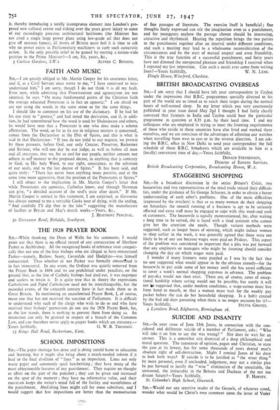STAGGERING SHOPPING
Sta,—In a broadcast discussion in the series Britain's Crisis, two housewives and two representatives of the retail trade voiced their difficul- ties, under the guidance of Sir George Schuster, in order to obtain a better understanding of each other's problems. One of the main difficulties (expressed by the retailers) is that as so many women do their shopping on Saturdays the smooth running of a business is apt to be seriously affected and extra staff must be engaged to cope with this week-end rush of customers. The housewife is equally inconvenienced, for, after waiting a long time to be served i she is faced with a tired assistant who cannot give her the attention she needs. Though various methods were suggested, such as longer hours of opening, which might induce women to shop earlier in the week, it was generally agreed that these were not likely to be of any use because wages were paid on Fridays. This aspect of the problem was considered so important that a plea was put forward that any employers or managers who might be listening should consider changing the day on which wages were paid.
I wonder if many listeners were puzzled as I was by the fact that no one suggested what would appear to be the obvious remedy—for the housewife to put aside some of her money until she has saved sufficient to cover a week's normal shopping expenses in advance. The problem of pay-day would not then exist. There are, of course, cases of excep- tional hardship where saving would not be possible; but surely it will not le suggested that, under modern conditions, a wage-earner must live from hand to mouth, or that a woman must wait for the weekly pay packet before she can do her household shopping. Is a habit created by the bad old days persisting when there is no longer occasion for it?— Yours faithfully, SYLVIA GROVES. 4 Lyttelton Road, Edgbaston, Birmingham z6.


































 Previous page
Previous page